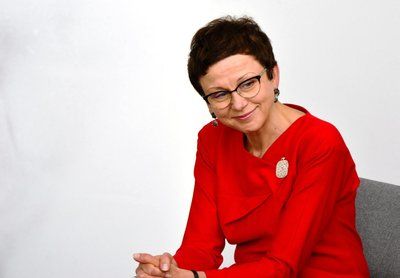“Why does my child eat snot?” “What if my child does not love me?” “How to put the child to sleep without tears?” “What if the child saw the parents during sex?” “How to tell the children about the divorce?” “How to control anger to your child?” “Why is the child afraid of the dark?” Such and even more questions from different fields were recorded after receiving the results of the analysis of the most frequent online search phrases, which was carried out at the initiative of the Vilnius private high school.
After seeing the findings of the study, the executive director of the high school, eduacologist, doctor of social sciences, Agnė Liubertaitė-Amšiejė, together with like-minded colleagues – prof. Dr. Vilma Žydžiūnaite and dr. Vaida Jurgile decided to organize this information and publish a book for parents, which is called “126 FAQs for parents on Google”.
“We wanted to create a kind of encyclopedia for parents, which could be used for any questions in life, and the answers would be based on science,” Dr. A. Liubertaitė-Amšiejė.
In an interview, the educationist told more about what kind of help modern parents are looking for Delphi for the Family.
– It seems that parents have no shortage of literature. How did you get the idea to write your book? Will it be any different from the others?
– The idea of the book first came about because, as a mother myself, I could not find such literature, where clear answers to endless questions of parents could be found in one place. I have read many books on parenting, parenting, etc. In addition to being a mother, I have worked in education for 17 years, and I have been disappointed because often these books are based on certain opinions. I miss so-called pop-science books, that is, books that are written on the basis of science and are interesting to read.
In addition, we all fly through life, and even after reading dozens of books, it would be impossible to get a systematic picture. And the further we go, the more we see that social networks are interfering with parent education. Now anyone with greater eloquence can be a guru and expert in social networks. That’s why we’ve come together to say ‘stop’ to it.
We decided to make an analysis of the most frequently asked questions by parents and answer these questions in the language of science – based on well-founded facts and reliable sources, and not on superficially heard seminars and unverified information.
– What specialists contributed to writing this encyclopedia for parents?
– There are three co-authors of the book – me, dr. Agnė Liubertaitė-Amšiejė, prof. Dr. Vilma Žydžiūnaitė and dr. Vaida Jurgilė. We do not claim to be a jack of all trades who can answer all questions. However, as specialists and scientists, we are able to select sources, analyze them and convey them in a very simple, understandable language.

Prof. Dr. V. Žydžiūnaitė is a professor with a doctorate qualification in two fields – she completed doctoral studies at the Department of Nursing at the School of Health Sciences in Finland, as well as doctoral studies in the field of educational science at KTU. In our book, she analyzed and answered health questions.
At that time Dr. V. Jurgilė – a lecturer at the VDU Education Academy and editor-in-chief of a scientific journal, as a young mother herself, examined everyday issues of household organization.

So the three of us combined our knowledge and efforts to write a science-based structured encyclopedia for parents. The book was reviewed by the team of psychologists of Vilnius private high school, prof. Galdikiene, from the medical side – doctor Valerijus Morozovas, nutritionist Edita Gavelienė from the children’s nutrition issues.
– How did you choose the parents’ questions for your book? What are people most interested in? Maybe when you saw what information people are looking for, you were surprised by something?
– Since the Internet is the fastest tool for modern parents to find answers to questions, as early as 2022 In February, the Vilnius private high school commissioned an analysis of the most common problems of parents raising 2-6 year olds. children, phrases searched online. A wide arsenal of specialized tools was used for this.
The intensity of search phrases was analyzed not only in Lithuania, but also in other European countries – Latvia, Germany, England and Spain. We compared the repeated questions and phrases – we introduced a three-point scale in the statistics: 3 points mean that the question is very frequent, 2 – frequent, and 1 – fairly frequent, but it is emphasized that this issue was the most interested in Lithuania. We have categorized the phrases in our book by origin: child nutrition, physical health, bowel movements, urination, school, social skills, sleep, emotional health, fears, intimacy, divorce, household, organizational, fairy tales, and more.

The results obtained were not surprising, since most of the questions, especially when working in the field of education, were known and heard. However, it was surprising that the questions were quite intimate: why does my child eat snot? What if the child walks into the room during sex and sees the parents making love? These are the kinds of topics moms and dads won’t discuss at a birthday party. We saw that those questions are very personal, sensitive, so the answers must be very weighted and reasonable, and not, as is usually the case when asking questions on the Internet – incompetent.
– Since you analyzed different countries, it is interesting how Lithuanian parents look in this context. Are we different, or are all parents very similar?
– Lithuanians very often ask such painful and difficult questions: why doesn’t my child love me What to do if a child steals? What to do if the child no longer wants to communicate with the father in the event of a divorce? What to do if the child leans in for a kiss? Depression in children – is it normal? What to do if a child says cruel things? Also common health questions: is it possible to bathe a child when he coughs? What to do if a child does not want to brush a tooth? What to do if a two-year-old child has a toothache? What to do if the child does not eat vegetables?

In other countries, these issues were not so relevant. This shows that things related to medicine and psychology are important to us. And I will repeat myself here again – these are very sensitive questions and cannot be answered at the level of one-day advice.
– And in general, what picture of modern parents can be formed by seeing what answers they are looking for? Are the topics the same, from time immemorial, or maybe people were not interested in what they are now?
– I got the impression that even though questions are eternal, today’s parents are very brave to say that they don’t know something, they are bravely interested in it. Parenting is not self-evident and intuitive. In the past, there were often situations where if you don’t know something, you are condemned. After all, you, as a mother or father, should naturally know what to do if the child does not listen, if he is sick or something else happens. Unfortunately, that shaming culture still thrives. I have experienced this myself – I went to the doctor with my child, and he began to embarrass me, as I – a mother – do not know how to treat a child. And I, being a doctor of educational sciences, really don’t know. I did not get lost and asked the doctor to teach me this, but how many parents do not dare to ask for advice.
It is impossible to know everything. And I am glad that we are becoming very aware that we do not engage in self-activity, we do not experiment, but we ask, if we do not know something, we consult with specialists.











